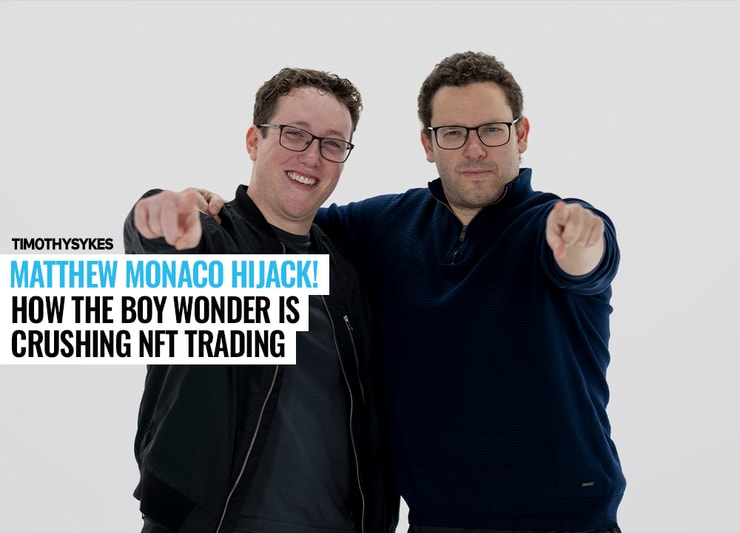Hey traders! Matthew Monaco here. I’m taking over the Tim Sykes blog for a minute because I need to tell you this…
Last summer, I spent over $14K on two Pudgy Penguins non-fungible tokens (NFTs).
Sykes ripped me a new one. He thought NFTs were stupid.
But he changed his tune when I sold them for over $63K (over two trades, here and here) a few weeks later.
One of the great things about Sykes is that he can admit when he’s wrong. He recognizes when it’s time to adapt.
That’s why I’m PSYCHED that he jumped on the NFT train. He’s got an NFT event coming up tomorrow. Not only is it a great way to jump-start your NFT education, but there will also be plenty of surprises. (I’m even kicking in a special offer.) Seriously — you do NOT wanna miss this.
I MUST Join Tim’s NFT Club Now!
Meantime, I’ve got a LOT to say about NFTs and their mind-blowing potential. Keep reading…
Table of Contents
Why I Got Into NFTs

2025 Millionaire Media, LLCI’ve made over $1.9 million over the course of my trading career. And I don’t just trade penny stocks. I trade crypto, too. That’s a lot … Why expand into NFTs?
Sykes likes to talk about how the right opportunities will bring him out of ‘retirement.’ For me, the NFT opportunities I saw were just TOO good to ignore.
I’m not the only one who saw the potential. Actually, I just interviewed Adam, a fellow Trading Challenge student who’s made over $1 million on NFTs so far. He’s also part of the event tomorrow with Sykes. Check it out:
As for my entry … I was really involved in crypto when NFTs went viral last summer. When I started researching, I thought it was crazy cool. So I immediately started researching a collection to get into…
Why Pudgy Penguins?
A few reasons.
First, I thought they were cute. I figured I have pretty good taste — someone else might like them, too.
But I backed up my gut feeling with research. Pudgy Penguins had a huge social following. There was a TON of Pudgy Penguin activity on Twitter and on Discord. And since the collection was still fairly new, there were still opportunities.
I also looked up the rarity — in the NFT world, that refers to an NFT’s uniqueness. It’s a factor that can drive up the price.
Overall, this collection checked all the boxes. So I bought an NFT in ethereum, for the equivalent of about $12K, and I rode the momentum over the next week or so. That trade made me $53,804.
The Importance of Preparation

2025 Millionaire Media, LLCAs a student of Sykes, I definitely value being prepared. That’s why I helped Sykes create his 30-Day Bootcamp for traders.
I’ve spent years learning how to trade penny stocks and crypto. All of that training allowed me to be prepared for the next big thing — like NFTs and crypto.
A lot of trading is about psychology. What’s the mob mentality, and how can I take advantage of it? It happens all the time with penny stocks — people wanting to hold ‘to the moon.’
With NFTs, I’m just trying to ride the momentum like I do with penny stocks.
That said, a strong foundation in penny stock and/or crypto trading will serve you well. The Trading Challenge is an incredible resource for trading education. As for crypto, my Crypto Bootcamp can be a great entry.
NFTs are not crypto. However, since they’re sold on the blockchain and usually bought and sold with cryptocurrencies, a foundational knowledge of crypto can help.
No doubt, crypto’s a big mystery for many people. To trade NFTs, you’ll need to understand some basics like how to open a crypto wallet and avoid scams.
More Breaking News
- SaverOne: The Latest Updates and Market Trends
- Sandstorm Gold’s Latest Moves: Time to Jump In?
- Transocean Ltd’s Stock Surges as Drilling Plans Boost Market Confidence
Do NFTs Have Long-Term Potential?

2025 Millionaire Media, LLCI think NFT technology will change the world.
There’s SO much potential. For instance, NFTs could change how we sign contracts. The month-long process of getting paperwork to buy a house could happen in minutes. It could revolutionize anything that requires a contract.
Right now, the current NFT world is very speculative. Eventually, I think that the top NFTs could follow a similar pattern to Pokémon cards, where they come back years later with increased value.
But just look at what’s happening with the Bored Ape Yacht Club. It’s expanded way beyond just an avatar. It’s more like a cult, and people want in. Many celebrities are breaking into the NFT world. I think that some NFTs will stick around and maintain value, especially if their respective communities keep innovating and expanding.
Wanna Join the Club?
When a die-hard penny stock trader like Sykes jumps on board with a new trading style, you’ve GOTTA at least check it out.
View this post on Instagram
NFTs are creating some of the most incredible trading opportunities in the current market. I don’t think it’s just a trend. I think we’re just getting started.
Ready to join the revolution? Start by attending the NO-COST event tomorrow to learn how to get started.
Get Access Now!
Did you like my takeover of the Sykes blog? What are your thoughts on NFTs? Leave a comment — I wanna know what you think!









Leave a reply